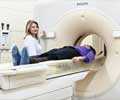A group of 74 US veterans has been involved in clinical trials which appear to have objectively diagnosed post-traumatic stress disorder (PTSD)
A group of 74 US veterans has been involved in clinical trials which appear to have objectively diagnosed post-traumatic stress disorder (PTSD), something conventional brain scans, be it X-ray, CT or MRI, have thus far failed to do.
The findings, published today, Wednesday, 20 January, in IOP Publishing's Journal of Neural Engineering, have sprung from advances in magnetoencephalography (MEG), a non-invasive measurement of magnetic fields in the brain.The researchers from the Minneapolis Veteran Affairs Medical Center and the University of Minnesota, led by Apostolos P Georgopoulos and Brian Engdahl, worked with the 74 veterans - all of whom had served in either World War 2, Vietnam, Afghanistan or Iraq, and had been diagnosed with behavioural symptoms of PTSD - and a control group of 250 individuals from the general public with clean mental and neurological health.
With more than 90 per cent accuracy, the researchers were able to differentiate PTSD patients from healthy control subjects using the synchronous neural interactions test which involves analysing the magnetic charges released when neuronal populations in our brains connect or 'couple'.
The ability to objectively diagnose or 'biomark' PTSD is the first step towards helping those afflicted with this severe anxiety disorder which often stems from war but can be a result of exposure to any psychologically traumatic event. The disorder can manifest itself in flashbacks, recurring nightmares, anger or hypervigilance.
Further to being able to distinguish between the neural activity of those suffering with PTSD and the mentally healthy, the researchers also found a positive association between the certainty of their predictions and the severity of symptoms which suggests we might also be able to use MEG to gauge levels and the true identity of each sufferer's disorder.
The researchers write, "The excellent results obtained offer major promise for the usefulness of the synchronous neural interactions test for differential diagnosis as well as for monitoring disease progression and for evaluating the effects of psychological and/or drug treatments."
Advertisement
Advertisement
THK














